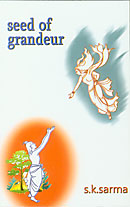
Seed of Grandeur
Commentary on Sri Aurobindo’s ‘Thought the Paraclete’, ‘Rose of God’ and Savitri
— S. K. Sarma
It took quite some time for Indian academicians to digest the fact that Indians could write excellent English. In the 1960s Professor Srinivasa Iyengar was able to introduce a paper on Indian writing in English in Andhra University for the Honours Course in English literature—the first university to do so. The syllabus was the next problem. Fiction could be canvassed easily but there was a hitch with poetry. Sri Aurobindo’s poetry was not easily accepted. “It is difficult to understand.” “How to teach mystic poetry?” “How to interpret in an Indian classroom a poem like ‘Thought the Paraclete’?” Fortunately, Prof. Iyengar himself held the classes in Andhra University, so the foundation for studying Sri Aurobindo in the confines of academia was laid well. When Prof. Iyengar retired, it became necessary for others to take up the subject. His students, such as L. S. R. Krishna Sastri and the author of this book, Krishna Sarma, continued the task. As the latter confesses, it was not easy and for him it was but an “occupational hazard”.
The hazard was transformed into substantial work when he brought out a slim book on the three prescribed poems in the syllabus: “Rose of God”, “Thought the Paraclete” and “The Symbol Dawn”. It was, of course, tailored to suit the students and was welcomed eagerly. Fortunately, coming from an academic background, and being a very serious student of English literature and Indian philosophy, Prof. Krishna Sarma had himself sowed the seeds of expansion in the Seed of Grandeur (1972). Andhra Pradesh has a rare closeness with Sri Aurobindo. In 1948 the Vice-Chancellor of Andhra University, Dr C. R. Reddy, who was a great admirer of the Mahayogi, was able to persuade Sri Aurobindo to accept the institution’s National Prize in Humanities, the only award he accepted in his earthly life. The message he gave to the University at that time is now a historic document.
However, the academic world has been hesitant in enlarging its approaches to Sri Aurobindo. As Krishna Sarma confesses in his recent work, “Many of the University Departments have de-emphasized Sri Aurobindo.” This has been a blessing in disguise for Sarma, as there is now no need to worry about post-graduate syllabus students. After breezing through the two short poems, he takes up the inner spaces of Sri Aurobindo’s philosophical thought for study as found in Book One of Savitri. After an introduction positing the argument in the canto, he deals with the verse paragraphs and explains them.
Admittedly it is difficult to convey the Aurobindonian philosophy as pellets of logic, using the critical tools of the West. Sri Aurobindo himself was not in favour of being dubbed a philosopher. He was right, for he comes in the tradition of Indian seekers who recorded what they “saw” (darshana). Indian philosophical thought opens with the Upanishads but they are not mere logical statements. With Sri Aurobindo also, his personal experience controls, however remotely, the logical progression of his philosophical ideas. He had had advaitic experiences but had no serpent-and-the-rope problem in connecting man, Nature and God in his writings. Dr. Sarma confesses:
My problem was, I was not trying to seek my Self. I was trying to apprehend the concept through my reasoning powers. For, I was trying to approach the world of advaita through my mind, and advaita insists that mind be de-activized.
Those of us who have known Dr. Sarma and his humility for decades, ever since we were students in the 1950s, get an accurate picture here of this intense scholar who keeps his tools of Reason razor-sharp. He finds in Sri Aurobindo’s approach a qualified monism, not unlike the one posited by Sri Ramanuja which speaks of creation as a leela-vibhuti. As Sarma puts it:
God, in a playful mood, seeking company, activates Prakriti with the urge to create, and he himself gets caught in the coils of the laws native to the lower Nature, the iron laws of Time, Nescience and Death, necessitating a retrieval or redemption, a return to the source from which this ‘fallen’ self has strayed, and necessitating the descent of Supramental Illumination, Savitri, to lift up the aspiring Satyavan to return to the felicity of Bliss and Divine Existence.
With this statement in hand, it becomes a self-realising journey to go through the rest of the volume. Seed of Grandeuris verily an anxious and friendly teacher by our side. Dialectical terminology is kept to a minimum. After all, as Sri Aurobindo said: “Reason was the helper; Reason is the bar.” Logic grows sterile in the presence of the Delight of Existence!
I wish this volume, which has an excellent illumination cover of Savitri reaching out to Satyavan, had been more reader-friendly in its print format. Well, there will always be the next edition for such a systematic and satisfying study of the first 3120 lines of Sri Aurobindo’s Savitri.
— Prema Nandakumar
Dr Prema Nandakumar is a well-known writer and literary critic. Her biography of the Mother, The Mother of Sri Aurobindo Ashram (National Book Trust) ran into several editions.
Sabda holds the copyright for this review. You can find more on the book here.





